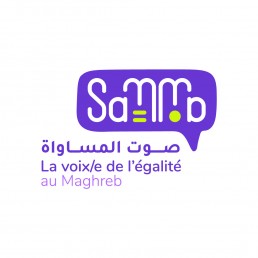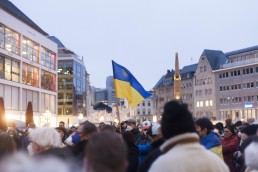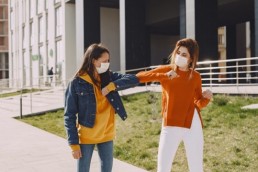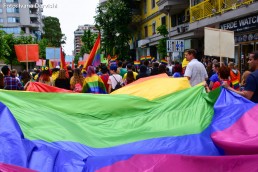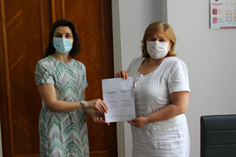SaMMa - the voice/s of equality
The project “SaMMa – the voice/s of equality” aims to promote a culture of equality and combat gender-based violence in Algeria, Morocco, and Tunisia. It operates by providing support to local CSOs involved in preventing violence and protecting and assisting women and girls, survivors of GBV. Additionally, the project collaborates with the media to address gender stereotypes that contribute to inequality and violence.
Led by a coalition of civil society organizations from the region in partnership with ERIM, the project supports young feminist organisations, especially young and recently established ones, as well as alternative and independent media.
The project’s actions target primarily youth in the three countries, employing innovative approaches that combine online communication and campaigning, capacity building training and activities for local CSOs. Lastly, SaMMa relies on the expertise of partner organizations that engage in collaboration and dialogue with national and local authorities to bring changes in legal frameworks, practices, and attitudes.”
Donors
- The French Development Agency
Mahalla - Strengthening the Media Community in Uzbekistan
This programme is aimed at supporting regional independent media outlets across all regions of Uzbekistan to become strong actors of democratization. The program will work to strengthen the capacities of the local media to provide quality content to their audiences whilst increasing citizens’ demand for objective, fact-based and reliable information in local communities via media literacy tools. Among the main objectives of the program is the development of a viable and sustainable Uzbek fact-checking community across the country involved in trainings, events, fact-checking contributions, etc. We will also strengthen the resistance of vulnerable youth to online hate speech and extremist propaganda through the educational game platform “QLEVER”.
Milestones
- Two Media Hackathons organized for local media outlets to increase networking, intersectoral collaboration and to develop fundraising capacity (March 2023 and 2024)
- Follow up small grants and long-term mentorship are available for media to strengthen their organizational capacity, improve content and increase their audiences (from April 2023)
- Factcheck methodology developed based on Uzbekistani context and factcheck website is created (December 2022 – April 2023)
- Three Fact-Checking ToTs for 36 local journalists from the 12 regions of Uzbekistan and Karakalpakstan Republic organized (February 2023)
- Trained journalists organize a series of 72 events and discussions for journalists, bloggers, students, etc. from their regions on the importance of fact-checking, promoting the program’s tools (from April 2023)
- Media tour for the most active contributors to the factchecknet.uz to Kazakhstan (May 2023)
- Uzbek factchecking community is further expanded through awareness raising events among key stakeholders (from April 2023)
- 6 new educational games for the QLEVER platform based on factcheck developed (October 2022 – December 2023)
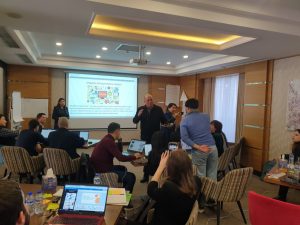
Project Activities
- Community Radio Experience Exchange (Leadership)
- On-the-Job Mentorship (Management/Leadership)
- Training- Audience Research for Enhanced Radio Content and Income Generation
- Training- Radio Program Production/Adobe Audition
- Training- Radio Program Production/Adobe Audition for Women Journalists
- Experience Exchange- Radio Program Production around Gender/GBV
- On-the-Job Mentorship- Journalism & Radio Program Production
- Community Radio Experience Exchange- Digital Tools for Community Engagement
- Community Radio Experience Exchange- Preventative Equipment Maintenance
- On-the-Job Mentorship- Digital Tools, Social Media for Community Engagement and Journalism
Donors
Special thanks to our donors:
- US Department of State Bureau of Democracy, Human Rights, and Labor (DRL)
Partners
Special thanks to our partners:
- Modern Journalism Development Center – MJDC
ESU - Emergency Support to Civil Society and Media in Response to the Ukraine War
The project
ESU is a 30 month project funded by the European Union which aims to strengthen the resilience and effectiveness of war affected CSOs and civil society actors in Ukraine, including independent media and human rights defenders.
The project supports civil society affected by the war in Ukraine to continue their work through three main areas of action
- Emergency support for relocation, core costs, legal, psychosocial and anti-burnout activities etc
- Capacity development training and grants, including online learning tools and team strategy retreats
- Advocacy activities including media campaigns, economic and social monitoring and activities combatting disinformation and promoting inclusion of IDPs or refugees.
Timeline
June 2022 – Project launch
July 2022 – Call for applications for project grants (ongoing throughout the project)
November 2024 – end of the project
Partners
Special thanks to our partners:
Team Up! - Media for Adult Education
Team Up! is a cross-European project aimed at fostering adults’ digital and Media and Information Literacy (MIL) and producing media and digital tools in Southern Europe. The project includes work with educators, teachers and librarians and is a continuation of our Speak Up! project, with young, newly arrived migrants.
To reach this objective, the first project’s component aims to support educators’, teachers’ and librarians’ critical competencies and skills of media consumption and production, increasing availabilities of Media and Information Literacy (MIL) digital tools for adult education.
The project’s second component focuses on fostering educators, teachers and librarians engagement with their communities within a collaborative dynamic for media production and Civic Media Literacy competencies development.
Finally, the project’s third component aims to increase European transnational collaboration between educators, teachers and librarians on combating discriminations, hate speech and xenophobia through non-formal learning activities contributing to civic engagement and social inclusion.
Find more on https://mediaforinclusion.eu
Timeline
- The development and dissemination of the Media and Information Literacy Toolkit (January 2022 – June 2022) and the Curriculum for MIL Trainings (May 2022 – June 2022), both to support the teachers, educators and librarians willing to run MIL workshops (January 2023 – March 2023);
- MIL Training of Trainers for teachers, educators and librarians MIL, including on gender in the media, migration and hate speech (September 2023 – November 2023);
- MIL workshops run by the teachers, educators and librarians who participated in the Training of Trainers for adult learners, with the support of the MIL trainers (January 2023 – March 2023);
- Networking sessions for MIL Trainers, and for educators, teachers and trainers who run MIL workshops to exchange good practices (May 2022 – October 2023);
- The MIL’Athon, during which the educators, teachers and trainers who ran MIL workshops will meet, work together and participate in a study visit and to a global MIL week event (June 2023);
- 4 Global MIL Week events in October 2023 for the closing of the project, each one organized in the project countries
Donors
- The Erasmus+ program of the European Union
Houqouq wa Moussawat حقوق ومساواة (Rights and Equality)
The project aims at fostering an effective implementation of Morocco’s legal framework concerning freedom of expression, association, and assembly. H&M implements a transversal approach on gender equality and is consistent with international standards and best practices.
The project’s first component focuses on restructuring an Observatory group created within a previous project called FEEAM. The objective of this group is to ensure a follow-up on violations related to freedom of expression, association, assembly, and gender-based violence in Morocco. Moreover, the Observatory group will mobilize and strengthen CSO’s capacities in advocacy on a national and international level.
The project’s second component aims at strengthening judges, lawyers, journalists and CSOs knowledge on Morocco’s legal framework and international standards on freedom of expression, freedom of press, right to access information, and gender equality, by monitoring the effectiveness of the adopted laws.
Timeline
- March 2021: project launch
- April 2021: Online press conference
- 2021 – 2023: Observatory group restructuring and policy dialogue series of technical meetings with MPs/Ministries
- 2021-2023: annual reports highlighting violation on freedom of expression, association, and assembly in Morocco
- May 2021: Capacity building training for journalists and lawyers on the international standards and the Moroccan legal framework related to freedom of expression and press
- 2021-2023: Media tour targeting journalists and CSO organizations
- 2021: Peer to peer study visits on the right to access information
- November 2021: Preparation and submission of the Universal Periodic Review (UPR) Morocco’s report
- 2021-2023: Capacity building of CSO and media sector on the Right to Access Information
- 2021-2024: Capacity building of CSO and media sector on gender equality and gender-based violence (VBG)
Donors
- European Union
- French Development Agency
Strengthening Community Radios
The ‘Strengthening Community Radios’ project is building a regional network of sustainable community radio stations that provide reliable local content to their audience. The project aims to increase access to information in Tunisia, Morocco and Algeria and build Media and Information Literacy (MIL) skills in order to improve citizens’ resilience to disinformation, fake news and hate speech.
More specifically, the project will organise regional exchanges and networking for radio stations across the three countries and MIL seminars and individual training sessions so that they can go on to produce and broadcast their own MIL-related media content.
In parallel, the radio stations will receive an individualized and tailored mentorship on institutional and financial sustainability and media content production, based on their needs.
Timeline
- October 2020: Project launch
- December 2020: Regional capacity building in Tunis
- December 2020 – February 2021: E-learning follow-up training and mentorship
- March 2021: Best practice exchange seminar
- April – September 2021: Individualized mentorship
- September 2021: Best practice exchange seminar
Donors
- National Endowment for Democracy
COVID-19: Civil Society Resilience and Sustainability
‘COVID-19: Civil Society Resilience and Sustainability’ works with civil society and independent media in Eastern Partnership countries with the aim of mitigating the immediate and longer-term impact of the COVID-19 pandemic. The project supports CSOs and independent media to keep working now and in the future through grants for: core support; psychosocial and legal support; technical support; capacity building; media campaigns and activities to combat false information. In Ukraine there are additional grants available for cooperation between CSOs, government oversight and for analysis and policy making.
The specific objective of the project is that civil society, the broader independent activist community, and independent media are supported to continue providing access to protection and assistance, especially to the most vulnerable groups, as well as accurate information about the pandemic.
Timeline
- July 2020: Project launch (July 2020)
- August 2020: First round of emergency support grants to CSOs and independent media including core support, technological support, psychosocial and legal support
- March 2021: Second round of emergency support grants to CSOs and independent media
- July 2021: Capacity development work with CSOs
- July 2021: Media campaigns with CSOs and independent media
- July 2024: End of the project
Pride II / + Promoting Rights Inclusiveness Dignity and Equality for LGBTI in Albania and Kosovo (Phase 2)
PRIDE II builds and expands on the results of the EU-funded PRIDE I project (Feb 2018 – Feb 2020)
It aims to empower CSOs to reach and support a maximum of LGBTI individuals while developing a stronger and better structured network of LGBTI supporting organisations and activists and improving the visibility and acceptance of the LGBTI community in Albania and Kosovo.
The capacity building activities should result in stronger LGBTI organisations and CSOs with increased advocacy skills, resources and efficiency to develop and implement cohesive and sustainable projects aimed at improving services and acceptance and visibility of the LGBTI community members in the project target Regions: Shkodra, Vlora Pogradec and Durres,
Consequently, the LGBTI community and individuals will feel better supported and more inclined to reach out to basic services. In the longer term, this will help develop a stronger and more diverse Albanian society which will ensure that the rights of their minorities are better protected.
Timeline
- Project Launch
- Identification of 5 subgrantees to implement 4 service provision subgrants and 1 awareness raising subgrant
- Capacity building trainings (advocacy, cyberbullying, transgender, Development of risk management protocole…)
- Historia-Ime platform news portal management
- Support to SOS helpline
- Community-based activities and service provision
- Support to Streha Shelter to provide accommodation and reintegration services to young homeless community members
- Training of young journalists
- Summer school for activists and young journalists
- PRIDE campaigns
Civil Society Organisation Capacity Development (CSO CD)
The ‘Civil Society Organization Capacity Development’ project works with a wide range of CSOs and grassroots organisations across the Eastern Partnership region and Eurasia. This includes organisations involved in human rights, gender equality (including women’s and LGBTQ rights), environmental issues and supporting at-risk groups and young people.
The project focuses on tailored, in-house capacity development for CSOs. Selected organisations are receiving support including but not limited to: individual consultancy such as in communications, organisation and management; training workshops; facilitated sessions for strategic planning; and strategy revision mentoring.
Alongside this individual support we are providing a range of grants open to all CSOs across the target region to support campaigning and advocacy activities; grassroots events; knowledge sharing and exchange; and anti-burnout support.
Timeline
- January 2020: Project launch
- August 2020: CSO Needs Assessment and mapping in the region
- March 2021: Organizational Assessment for selected CSOs
- December 2020 – December 2022: Tailored capacity building training workshops and mentoring
- 2021 -2022: Strategic plan implementation support, consultancy and mentoring
- 2021 -2022: Evaluation meetings
- June 2020-December 2022: Small grants for campaigning and advocacy activities; grassroots events; knowledge sharing and exchange; and anti-burnout support.
- December 2022: End of the project
Speak Up! Media for Inclusion
Speak Up! is a cross-European project aimed at integrating young, newly arrived migrants through video, radio production and media literacy trainings, leading to media and film festivals in all partner countries.
During the course of the project, training of trainers and webinars will be organised for 100 interested teachers and trainers, discussing the merits of using media production and media literacy trainings for the integration of newly-arrived migrants. Media training workshops will also be organised for young migrants as a way to help them integrate into their new environments and so that they can tell their stories and share information for their community and the broader public. Building on this success of the Ithaka Film Festival in the Netherlands, we will run the first Ithaka International Film and Media Festival in September 2021, showcasing the work produced during the workshops throughout the project alongside screenings of other films on migration.
Additionally, two international meetings will also take place – one in Utrecht University, the Netherlands and one at Central European University in Budapest, Hungary. The meetings will be used to discuss the project activities and how media training can be used to help migrants, both through facilitating their integration and through more responsible media reporting.
More on Speak Up! on https://speak-up-eu.com/
Timeline
- May 2020: Guidelines on video production, radio production and MIL are produced and freely available
- November 2020 – January 2021: 5 webinars with educators are conducted
- March 2021: 1 Manifesto
- January – June 2021: 300 young, newly arrived migrants are trained on video production, radio production and MIL
- September 2021: 1 Instagram Competition
- September-October 2021: 5 Films and Medias Festivals
